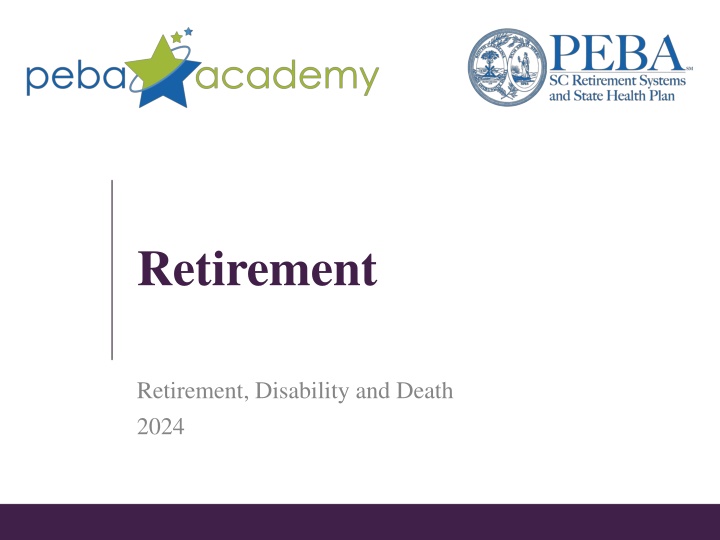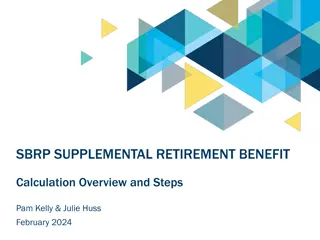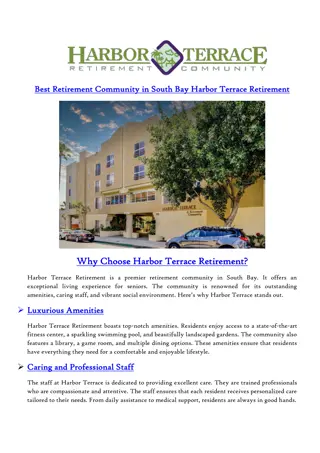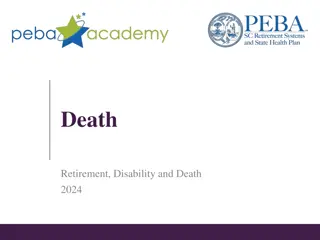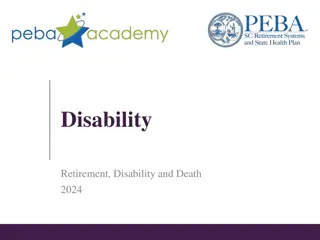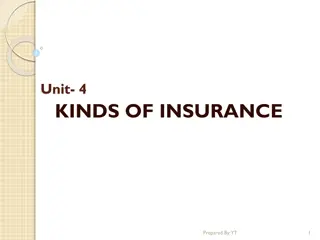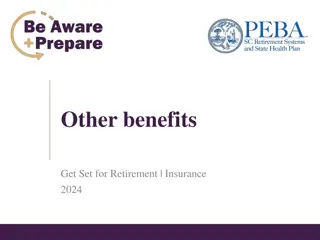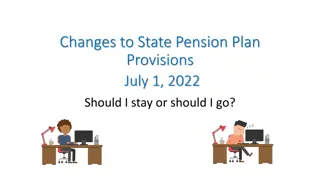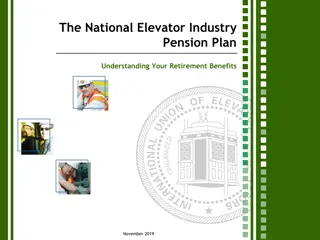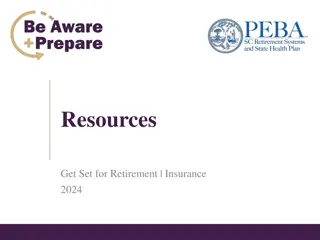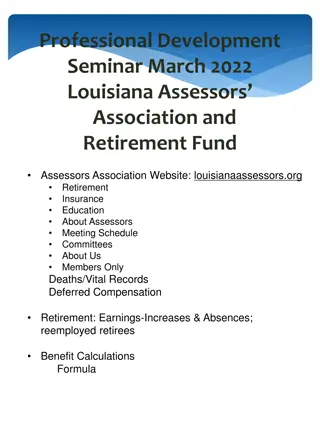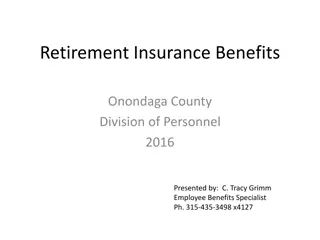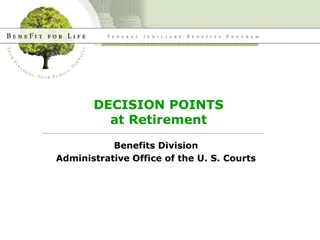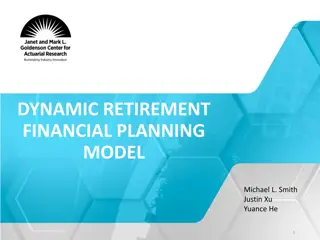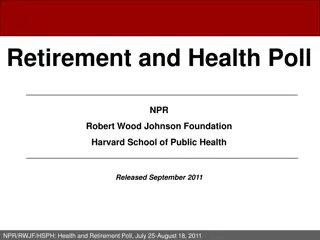Overview of Retirement, Disability, and Death Insurance Benefits
This overview provides information on retiree insurance eligibility, funding, and important considerations for employees planning for retirement. It emphasizes the complexity of determining eligibility for retiree group insurance, the requirements for funding, and the need to contact PEBA for accurate information before retirement decisions are finalized.
Download Presentation

Please find below an Image/Link to download the presentation.
The content on the website is provided AS IS for your information and personal use only. It may not be sold, licensed, or shared on other websites without obtaining consent from the author.If you encounter any issues during the download, it is possible that the publisher has removed the file from their server.
You are allowed to download the files provided on this website for personal or commercial use, subject to the condition that they are used lawfully. All files are the property of their respective owners.
The content on the website is provided AS IS for your information and personal use only. It may not be sold, licensed, or shared on other websites without obtaining consent from the author.
E N D
Presentation Transcript
Retirement Retirement, Disability and Death 2024
Important information This overview is not meant to serve as a comprehensive description of the insurance benefits offered by PEBA. More information can be found in the following: Benefits Administrator Manual; and Insurance Benefits Guide. The plan of benefits documents and benefits contracts contain complete descriptions of the health and dental plans and all other insurance benefits. Their terms and conditions govern all health benefits offered by or through PEBA. 2
Topics Retiree insurance eligibility and funding. Retiree insurance decisions. Non-Medicare and Medicare-eligible. Health, dental and vision. Life insurance, long term disability and MoneyPlus. Assisting an employee. Enrollment. Premiums and billing. Returning to work. 3
Retiree insurance eligibility Eligibility for retiree group insurance is not the same as eligibility for retirement. Determining retiree insurance eligibility is complicated, and only PEBA can make that determination. It is very important that employees contact PEBA before making final arrangements for retirement. See the Retiree Insurance Eligibility, Funding flyers. 4
Retiree insurance eligibility Regardless of how or when an employee becomes eligible for retirement, to qualify for retiree group insurance, their last five years of employment must be: Served consecutively; In a full-time, insurance-eligible permanent position; and With an employer that participates in the State Health Plan. Encourage employees to submit an Employment Verification Record form as early as six months prior to retirement date to start the process to determine eligibility and funding. If an employee has already applied for retirement, PEBA doesn t need the Employment Verification Record; a determination by PEBA should be in progress. 5
Retiree insurance funding Retirees of state agencies, public higher education institutions, public school districts or other employers that participate in the South Carolina Retirement Health Insurance Trust Fund may be eligible to receive state funding toward their premiums if they meet certain requirements. Optional employers and charter schools that participate in insurance only determine if their eligible retirees pay all or part of their insurance premiums. Changing jobs could affect an employee s eligibility for funding. 6
Retiree insurance funding State ORP participants may be eligible to receive state funding toward their premiums if they meet certain requirements. Employers who do not participate in a PEBA-administered retirement plan set funding rules for eligible members. If a charter school does not participate in a PEBA-administered retirement plan and the employee meets the eligibility requirements for retiree group insurance, employer funding, if any, is at the discretion of the charter school. 7
Non-Medicare health plan choices State Health Plan, which includes prescription benefits. Standard Plan. Savings Plan. TRICARE Supplement Plan, for eligible members of the military community. TRICARE rules apply. Coverage ends at age 65. 8
Enrolling in Medicare Once eligible, subscribers should enroll in Medicare Parts A (hospital coverage) and B (medical coverage). The Medicare enrollment period begins three months before 65th birthday. If receiving Social Security benefits, the Social Security Administration will contact subscribers and enroll them automatically. Otherwise, subscribers must contact Social Security to enroll. 9
2024 Medicare benefits There is no Medicare or Medicare Supplemental Plan coverage outside the U.S. and U.S. territories. Part A (hospital benefits) Part B (medical benefits) $1,632 deductible per benefit period.1 No monthly premium if enough work credits established. $240 annual deductible.1 $174.70 (standard monthly premium as determined by Medicare). Plan pays 80% of approved charges. 1Medicare deductibles are subject to change. 10
Becoming Medicare-eligible before age 65 Subscribers must notify PEBA and provide a copy of Medicare card. Subscribers can change health plans within 31 days of Medicare Part A eligibility. 11
Medicare-eligible health plan choices in retirement State Health Plan, which includes prescription benefits. Medicare Supplemental Plan. Carve-out Plan. See Insurance Coverage for the Medicare-eligible Member handbook for detailed information. If enrolled in the TRICARE Supplement Plan, can cancel or switch health coverage once reaching Medicare Part A eligibility. TRICARE becomes TRICARE for Life, a Medicare supplement. 12
2024 Medicare Supplemental Plan Pays Medicare Part A deductible ($1,632).1 Pays Medicare Part B deductible ($240). 1 Pays Medicare coinsurance, up to 100% of Medicare-approved charges. Offers no coverage outside the U.S. Includes prescription drug benefit. Claims for non-Medicare subscribers are processed under the Standard Plan. 1Medicare deductibles are subject to change. 13
Automatic enrollment in the Medicare Supplemental Plan Automatic enrollment for retirees and dependents who reach age 65 and participate in the State Health Plan. PEBA sends a notification to subscriber three months before 65th birthday. Can choose to opt out of the Medicare Supplemental Plan and be covered under the Carve-out Plan. Medicare will be primary whether the retiree opts out, provided they did not return to work in an insurance-eligible position on active coverage. If subscribers enroll in the Carve-out Plan in retirement, Medicare will still pay first toward their expenses. 14
2024 Medicare Supplemental Plan benefits example If covered by the Medicare and Medicare Supplemental Plan, the claim will be processed like this: Next, the Medicare Supplemental Plan benefits are applied: Remaining bill $1,632 Medicare-approved amount $7,500 Medicare Supplemental Plan pays Medicare Part A deductible $1,632 Medicare Part A deductible1 - $1,632 Total payment $0 Medicare payment $5,868 Remaining bill $1,632 1Medicare deductibles are subject to change. 15
Carve-out Plan with Medicare If provider accepts amount Medicare allows as payment in full, the Carve-out Plan will pay the lesser of: The amount Medicare allows, minus what Medicare reported paying; or The amount the State Health Plan would pay in the absence of Medicare, minus what Medicare reported paying. Pays primary if outside the U.S. and U.S. territories, where Medicare does not cover. Learn more in the Insurance Coverage for the Medicare-eligible Member handbook. 16
Medicare Part D drug program Most subscribers covered by PEBA should remain enrolled in Express Scripts Medicare, the State Health Plan s Medicare Part D drug program. Express Scripts will send a letter about how to opt out and remain covered by the State Health Plan Prescription Drug Program. Subscribers have 21 days to opt out. Subscribers can have only one Part D plan. If they enroll in a separate Part D program, subscribers lose PEBA prescription benefits but do not have a reduction in premiums. Learn more in the Insurance Benefits Guide or contact Express Scripts, the pharmacy benefits manager. 17
Medicare Supplemental Plan and Carve-out Plan prescription benefits 90-day supply at network pharmacy or mail-order pharmacy 30-day supply at network pharmacy Tier 1 (generic): $13 Tier 1 (generic): $32 Tier 2 (preferred brand): $46 Tier 2 (preferred brand): $115 Tier 3 (non-preferred brand): $77 Tier 3 (non-preferred brand): $192 Subscribers pay up to $3,000 per person in prescription drug copayments. Then, they pay nothing. 18
Dental Plus and Basic Dental Coverage is the same as active subscriber coverage. Enroll within 31 days of retirement or special eligibility situation. Enroll during open enrollment in odd-numbered years. Once enrolled, must remain enrolled until next odd-numbered year open enrollment period or within 31 days of a special eligibility situation. 19
State Vision Plan Coverage is the same as active subscriber coverage. Enroll within 31 days of retirement or special eligibility situation or yearly during open enrollment. 20
Life insurance Basic Life insurance Can convert coverage to a whole life policy within 31 days of retirement if you were enrolled in a health plan offered through PEBA at retirement. Optional Life insurance Can convert existing coverage to a whole life policy within 31 days of retirement. Can continue existing coverage within 31 days of retirement. Continue coverage in $10,000 increments. Continued coverage will reduce to 65% at age 70. Retiree coverage ends the January 1 following the retiree s 75th birthday. Dependent Life insurance Can convert existing coverage to a whole life policy within 31 days of retirement. 21
Life insurance premiums in retirement Converted policy premiums are underwritten individually by MetLife. Retirees continuing coverage will pay the same premium as active employees. Retirees will receive the continuation and/or conversion forms directly from MetLife. 22
Long term disability Basic Long Term Disability: Available only to active employees enrolled in a health plan. Ends at retirement. Cannot be converted to an individual policy. Supplemental Long Term Disability: Available only to active employees. Ends at retirement. Cannot be converted to an individual policy. 23
MoneyPlus and Health Savings Accounts Available only to active employees. Retirees in the Savings Plan who are not eligible for Medicare may continue Health Savings Account contributions, but not pretax through payroll deduction. 24
Assisting an employee The Retiree Packet, available at peba.sc.gov/forms, is a comprehensive packet that includes: Retiree Insurance Eligibility, Funding flyers; Employment Verification Record; Certification Regarding Tobacco or E-cigarette Use; and Other helpful information. Service and disability retirement life event checklists available at peba.sc.gov/publications for both members and employers. Insurance Coverage for the Medicare-eligible Member handbook. Retiree Notice of Election form. 25
Enrollment If PEBA determines employee is eligible for retiree insurance, employee must complete and submit: Retiree Notice of Election; and Certification Regarding Tobacco and E-cigarette Use. PEBA is the benefits administrator for retirees of state agencies, public higher education institutions, public school districts and charter schools that participate in both insurance and retirement. Retirees of participating optional employers and charter schools that participate in insurance only keep the same benefits administrator from their former employer. 26
Premiums and billing Retirees of state agencies, public higher education institutions, public school districts and charter schools that participate in both insurance and retirement: Premiums are deducted from monthly retirement benefit payments1 or through bank draft. Depending on when retirement paperwork is finalized, more than one month s premium may be deducted from first benefit payment. If premiums are due before retirement is finalized, PEBA sends a bill until the benefit payment is processed. Retirees of optional employers and charter schools that participate in insurance only: Premiums are billed to the employer who must submit payment in full to PEBA. Retirees pay premiums directly to employer. Premiums are due by the 10th of each month. PEBA will cancel coverage if payment not received. 1If total premiums are more than amount of check, PEBA will bill the retiree for the full amount. 27
Returning to work for participating employer after retirement If retiree returns to active employment in an insurance-eligible position, retiree will no longer be eligible for retiree coverage.1 Must elect active coverage and may be eligible for additional benefits; or Refuse all PEBA-sponsored coverage. If hired and not in an insurance-eligible position, retiree may remain on retiree coverage. Once active employment ends, retiree may return to retiree coverage within 31 days. Provide the How Returning to Work Will Impact Your Insurance Benefits flyer. Learn more in the Insurance Benefits Guide. 1Retirees who are not eligible for Medicare and who retired from an employer that does not participate in the state s Retiree Health Insurance Trust Fund can remain on retiree coverage if they return to work in an insurance-eligible position. Contact your previous employer if you are unsure whether it participates in the Retiree Health Insurance Trust Fund. 28
Returning to work for participating employer after retirement (Medicare-eligible) Medicare cannot be primary for retiree or any covered family members while enrolled in coverage as an active employee. Enroll as an active employee with Medicare as the secondary payer; or Refuse all PEBA-sponsored health coverage and have Medicare coverage only. Retirees may keep dental and vision coverage with PEBA. If enrolled in active coverage, retiree must notify Social Security Administration (SSA). Learn more in the Insurance Coverage for the Medicare-eligible Member handbook. Once active employment ends, retiree may return to retiree coverage within 31 days, and Medicare will be primary. Retiree must also notify the SSA again. Medicare A and B needed for full benefits. 29
Disclaimer This presentation does not constitute a comprehensive or binding representation of the employee benefit programs PEBA administers. The terms and conditions of the employee benefit programs PEBA administers are set out in the applicable statutes and plan documents and are subject to change. Benefits administrators and others chosen by your employer to assist you with your participation in these employee benefit programs are not agents or employees of PEBA and are not authorized to bind PEBA or make representations on behalf of PEBA. Please contact PEBA for the most current information. The language used in this presentation does not create any contractual rights or entitlements for any person. 30
